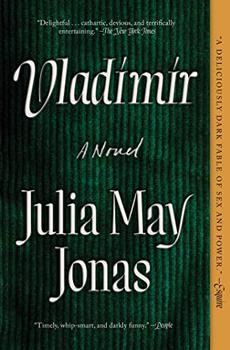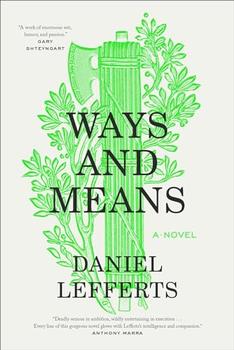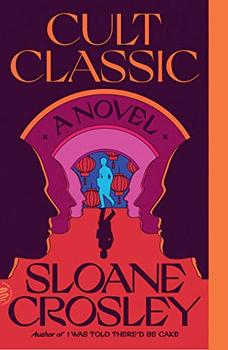Summary | Excerpt | Reading Guide | Reviews | Beyond the book | Read-Alikes | Genres & Themes | Author Bio

A Novel
by Julia May JonasIn Vladimir, Julia May Jonas's debut, the campus novel meets and melds seamlessly with the #MeToo novel. The unnamed narrator is a 58-year-old tenured English professor at a small liberal arts college and a two-time novelist. Her husband, John, is also a professor and chair of the department, although he was recently suspended when seven women, former students, stepped forward and claimed he slept with them (he didn't deny it). Inevitably a petition for his removal was circulated. The narrator knew about these affairs at the time, and insists that John did nothing wrong. In fact, her anger at first is directed mostly at the women, who, in her view, are embarrassingly lacking in self-respect. Why undersell their own agency in relationships? Why undervalue their own feelings of lust and attraction? In her day, she says, feminism was about sex as freedom—from judgment, from guilt—not trauma.
Jonas's narrator certainly isn't a mouthpiece for all older women, but the schism between generations—how they conceive of power and sexuality; what they want and demand from relationships and from art—is at the center of the novel. There's something naive, almost anti-intellectual, in the way her students operate, she thinks; they rely on their feelings and surface-level analyses of representation instead of more substantial interpretation. But is there, indeed, something to the social and artistic reevaluation going on, despite how mobbish and policing it seems to her? She is challenged throughout the novel by younger thinkers, including her adult daughter, Sidney, who returns home in tears after a breakup with her girlfriend; and Edwina, a Black student who (briefly) forces the narrator to stop mindlessly referring to herself as an "old white woman" and actually confront how whiteness functions in the department. At the same time, the main character is experiencing her own sexual obsession and ambiguous romance with Vladimir Vladinski, the new, hot, young (and eponymous) professor. Her interactions with Vlad give the novel its shape and beats, and her lust drives much of its plot, which culminates in an extreme scene that is previewed in the novel's prologue (it involves shackling him to a chair).
The narrator's voice is opinionated but vulnerable, and one of Vladimir's great pleasures is her various digressions about femininity, motherhood, domestic labor and the "heterosexual prison." She has thought a lot about Being a Woman, and those thoughts are intelligent and compelling, even if she's not exactly a moral paragon and even if Being a (white, heterosexual) Woman isn't the intellectually fertile or groundbreaking subject it once was. "Why are all these white women so obsessed with being female?" one student asks in class; "I just don't know why we have to read these whining women," adds another.
Vladimir is also very funny, and much of its humor comes from the narrator's judgments of others, students being the easiest target. There are barbs about the zeitgeisty, near-constant use of the word "liminal," and the rise of creative nonfiction among students—is it due to narcissism or fear, the narrator wonders. She stalls for time at the beginning of one class by asking her students how they're doing, and comments, "luckily, all my students love nothing more than to speak about their psychological wellness, so my buying time was met with some eager stories about medication, campus counseling, time management, and ADHD, told with wry self-awareness."
These aren't cruel jokes, though—just recognizable observations if you've been near a college campus recently, lightly mocking but also sympathetic and even appreciative. Yes, sometimes the narrator comes off as a bitch, and her students clownish, but Vladimir is neither a skewering of campus political correctness nor a complete indictment of its protagonist. There is moral reckoning in these pages, sometimes intellectualized and sometimes based on something more primal, like guilt and pain.
The narrator is also constantly and acutely analyzing the social and gender dynamics among the faculty; it's no coincidence that she's a skilled close reader and interpreter of literature. Mating seems to be an influence, as Norman Rush is namechecked as Vlad's hero, and the novel is also in conversation with Rebecca, which the narrator is teaching to her students; both feature unnamed female narrators who also spend a lot of time in their heads, thinking about gender dynamics. The narrator is equally attuned to the behavior of men (objects of desire) and women (her implicit competition) and is no less harsh on herself; vanity is her biggest flaw, she admits. She's often disgusted with her appearance, and nothing thrills her like being told she looks younger than she is.
Much of this analysis—and self-loathing—is sparked by her interest in Vladimir and the other complicated feelings that interest dredges up. Her lust inspires her to start writing fiction again, which coincides with Sidney coming home; for the first time in years, the narrator is once again an active mother, writer and sexual being. The overlap between erotic, maternal and creative impulses are explicit, and at times the narrator herself seems aware of how muddled her desires are. Luckily, confusion and longing make for great fiction, especially when a character is willing to act, and to reach for what she thinks she wants.
![]() This review was originally published in The BookBrowse Review in March 2022, and has been updated for the
February 2023 edition.
Click here to go to this issue.
This review was originally published in The BookBrowse Review in March 2022, and has been updated for the
February 2023 edition.
Click here to go to this issue.

If you liked Vladimir, try these:

by Daniel Lefferts
Published 2024
A searing debut novel about a striving finance student, the line between ambition and greed, and the disordered politics of our era.

by Sloane Crosley
Published 2023
Hilariously insightful and delightfully suspenseful, Cult Classic is an original: a masterfully crafted tale of love, memory, morality, and mind control, as well as a fresh foray into the philosophy of romance.
Your guide toexceptional books
BookBrowse seeks out and recommends the best in contemporary fiction and nonfiction—books that not only engage and entertain but also deepen our understanding of ourselves and the world around us.